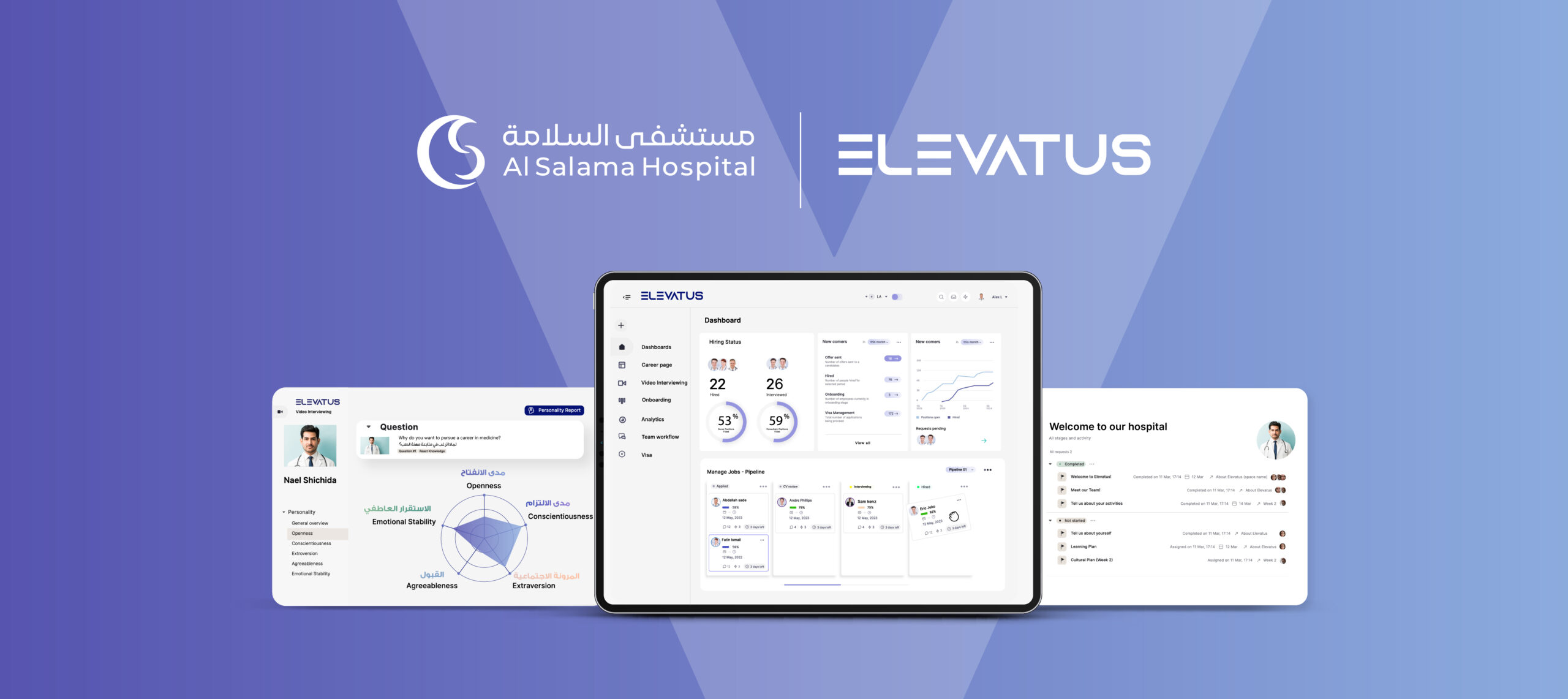
HR Resources
Remote Job Interview Questions Made Easy: 5 Proven Strategies to Tackle
May 20, 2022
Reem Al-Tamimi
Content Writer
The global pandemic has led to an increase in online recruitment. As a result, companies are now facing the challenge of effectively evaluating candidates through platforms like Zoom or Skype. However, we have the ideal solution to address this concern.
As you venture into the world of video assessment interviews with remote candidates, the key lies in creating an environment that effortlessly facilitates task execution from any off-site location. And it all starts with crafting captivating and relevant remote job interview questions that delve deep into the candidates’ abilities and match them perfectly to your desired role.
Now, get ready to elevate your game with our invaluable tips, guaranteed to transform your approach and ensure success in the world of remote job interview questions.
Conquering Challenges Faced by Remote Teams
Remote teams face unique challenges that require careful consideration during the recruitment process. By understanding these challenges, you can better identify candidates who are well-suited for distributed team environments. Here are key challenges to be aware of, along with strategies to address them:
- Communication: Effective communication is vital for remote teams, especially in distributed settings. Look for candidates who excel in both verbal and written communication, as they will be able to communicate and collaborate effectively with team members, despite physical distance.
- Lack of direct supervision: When working remotely, employees must be self-motivated and able to manage their time effectively. Seek candidates who demonstrate self-discipline, motivation, and the ability to work independently in a full-time remote role.
- Culture fit: Building a strong team culture can be challenging in a distributed team. Consider candidates’ adaptability and their ability to integrate into the team’s culture, even without regular in-person interactions. Look for individuals who show collaboration skills and the ability to connect with colleagues, fostering a sense of camaraderie.
To ensure success, provide candidates with the necessary tools and resources for a productive home office setup. This includes access to reliable technology, such as a suitable computer and a stable internet connection. Additionally, assess candidates’ time management and organizational skills, as remote work requires effective self-management and the ability to prioritize tasks.
By prioritizing candidates with strong communication skills, self-discipline, adaptability, and the ability to manage their time effectively, you can assemble a high-performing remote team that thrives despite the challenges. Embrace the advantages of remote work by finding candidates who are enthusiastic about distributed teams and well-suited for the demands of full-time remote roles.
How To Evaluate Candidates While Recruiting Online


Recruiting online brings unique challenges in evaluating candidates. However, with the right approach, you can identify top talent for your remote team. Here are essential strategies to consider:
- Conduct video interviews: Utilize video interviews to assess candidates’ communication skills, as remote teams heavily rely on platforms like Zoom or Hangouts for interaction. Tech-savvy candidates who are comfortable with such tools are likely to exhibit confidence during their interviews.
- Include written assignments: Evaluate candidates’ written communication abilities by assigning tasks such as writing clear emails or reports that require minimal back-and-forth communication. This is particularly crucial when working across different time zones. Additionally, assess their ability to meet deadlines and follow instructions effectively.
- Assess critical thinking skills: Remote workers cannot conveniently visit their manager’s office for immediate guidance. Therefore, it’s important to hire individuals who are decisive, take ownership of their tasks, and demonstrate initiative when faced with challenges. Pose hypothetical scenarios to gauge their ability to exercise sound judgment and problem-solving skills.
By incorporating these strategies into your online candidate evaluation process, you can identify candidates who possess strong communication skills, adaptability to remote work tools, and critical thinking abilities. This will help you build a high-performing remote team that excels in independent decision-making and collaboration, overcoming the challenges of distance and time zones.
Emotional Intelligence Remote Job Interview Questions
Emotional intelligence, or EQ, is a vital factor for success in the workplace. It influences a person’s ability to connect with others, adapt to changing circumstances, handle challenging situations with finesse, and accurately “read the room” (which can be tricky in a virtual setting).
Neglecting to consider EQ during online recruitment may lead to suboptimal decision-making. Therefore, when refining your remote job interview questions, it’s essential to include ones that provide insights into a candidate’s emotional intelligence. Here are some of our favorite remote job interview questions to gauge EQ:
Tell me about a workplace conflict you were involved in, either with your peers or someone else in the company. How did you manage that conflict, and were you able to resolve it?
This question aims to gauge a candidate’s ability to navigate and resolve conflicts in a professional setting. It provides insights into their conflict management skills, communication style, and problem-solving approach.
If you’ve previously reported to multiple supervisors at the same time, how did you get to know each person’s preferences and juggle conflicting priorities?
This question assesses a candidate’s ability to adapt and thrive in a complex work environment with multiple supervisors. It explores their organizational skills, communication abilities, and capacity to manage conflicting priorities while building relationships with different supervisors.
Tell me about a time when you received feedback on your performance and you disagreed with the feedback. How did you handle the situation?
This question delves into a candidate’s openness to feedback and their ability to handle disagreement constructively. It explores their emotional resilience, receptiveness to different perspectives, and how they navigate challenging conversations with professionalism and respect.
These thought-provoking remote job interview questions are designed to provide valuable insights into a candidate’s emotional intelligence. Incorporating them into your recruitment process will help you make informed decisions and select individuals who possess the essential skills to thrive in a remote work environment. With effective communication, adaptability, and collaborative problem-solving, your team can flourish, even in a virtual setting.
Some Other Great Sample Interview Questions To Ask


As the shift towards remote work continues to reshape the employment landscape, assessing candidates for remote positions requires a nuanced approach. Beyond the technical skills and qualifications, it is essential to evaluate candidates’ emotional intelligence (EQ) and their ability to thrive in a remote work environment. To gain a deeper understanding of their EQ and suitability for remote work, incorporating specific remote job interview questions is crucial.
Let’s explore these remote job interview questions and answers to help you identify candidates who possess the key attributes necessary for thriving in a remote work setting.
If you have worked remotely before, what were the biggest challenges you faced? How did you overcome them?
This question seeks to understand the candidate’s past experiences with remote work challenges. It provides insight into their problem-solving abilities and adaptability. Look for candidates who demonstrate resilience and resourcefulness in overcoming obstacles.
Sample answer: “One of the biggest challenges I faced while working remotely was maintaining clear communication with team members due to the lack of face-to-face interactions. To overcome this, I made sure to schedule regular video calls and utilized collaboration tools to stay connected. I also made an effort to proactively communicate updates and seek clarification when needed, ensuring that everyone was on the same page.”
How do you schedule your day?
This question assesses the candidate’s time management skills and their ability to structure their workday effectively. Look for candidates who can demonstrate a disciplined approach to managing their time and prioritizing tasks.
Sample answer: “I believe in structuring my day for optimal productivity. I start by identifying my top priorities and setting specific time blocks for focused work. I utilize a digital calendar to schedule tasks and allocate time for breaks to maintain energy and avoid burnout. This helps me stay organized and ensures that I can effectively manage my workload and meet deadlines.”
What kinds of distractions do you usually have when working from home? How do you ensure they don’t interfere with the quality of your work?
This question helps to evaluate the candidate’s self-awareness and their strategies for maintaining focus and productivity in a remote environment. Look for candidates who acknowledge potential distractions and show proactive measures to mitigate their impact.
Sample answer: “Working from home can present various distractions, such as household chores or family members needing attention. To mitigate their impact, I establish a dedicated workspace that is free from distractions. I communicate clear boundaries with my family members, letting them know my work hours and when I need uninterrupted focus. Additionally, I employ time management techniques like the Pomodoro technique, where I work in focused intervals and take short breaks, allowing me to maintain high-quality work despite potential distractions.”
Do you check your emails after work?
This question explores the candidate’s boundaries between work and personal life. It assesses their ability to disconnect and maintain a healthy work-life balance. Look for candidates who prioritize self-care and setting clear boundaries to avoid burnout.
Sample answer: “I believe in establishing a healthy work-life balance, and part of that involves setting boundaries around email communication after work hours. Once my workday is complete, I make a conscious effort to disconnect from work-related emails. This allows me to recharge and prioritize personal time, ensuring that I am refreshed and ready to tackle the next workday with renewed focus.”
What would you do if you had internet connection problems during a meeting with your manager or a call with a customer?


This is one of the remote job interview questions that assess the candidate’s problem-solving skills and ability to handle unexpected challenges in a remote setting. Look for candidates who demonstrate resourcefulness and quick thinking, such as having backup plans or alternative communication methods in place.
Sample answer: “In the event of internet connection problems during an important meeting, I would immediately troubleshoot the issue by checking my internet connection, restarting the router if necessary, or switching to a backup internet source like a mobile hotspot. If the problem persists, I would quickly notify the participants about the technical difficulties and suggest rescheduling the meeting or finding an alternative communication method, such as a phone call or audio-only conference. Clear and proactive communication is key in such situations to minimize disruptions and find effective solutions.”
When interviewing for a remote job, asking these remote job interview questions can give you important information about how candidates handle remote work challenges, manage their time, stay focused, balance work and personal life, solve problems, and communicate effectively. These insights are crucial for finding candidates who are ready to tackle the specific demands of remote work and make a positive impact on your team’s achievements.
Red Flags To Keep In Mind
When recruiting online, it is crucial to be mindful of the following red flags. By keeping these in mind, you can steer clear of making the wrong hire and find the best candidates for your remote team:
- Poor communication skills: Candidates who struggle during video interviews and demonstrate ineffective email communication abilities may not be well-suited for remote work. Strong communication skills are essential for effective collaboration and seamless remote communication.
- Lack of team spirit: Even though remote employees work independently, it is still important for them to possess good team spirit. Remote workers often collaborate with colleagues and participate in group projects. Look for candidates who demonstrate the ability to work well in a team, value collaboration, and contribute positively to collective goals.
- Inability to balance work and personal life: Remote jobs offer flexible work schedules, but it is vital for candidates to maintain a healthy work-life balance. Candidates who are unable to set boundaries and end up working excessively long hours are at risk of burnout. Look for individuals who prioritize self-care and demonstrate an understanding of maintaining a sustainable work-life balance.
By paying attention to these red flags, you can ensure that the candidates you select possess strong communication skills, a team-oriented mindset, and the ability to maintain a healthy work-life balance. This will help you build a cohesive and productive remote team that thrives in a collaborative and supportive environment.
All in All
Job seekers today seek more than just salary increases. They also value flexibility, well-being, and a workplace culture that resonates with their values and sensibilities. When recruiting online, interviews that delve into these aspects can provide valuable insights for both candidates and employers. This is where our recruiting software comes in, revolutionizing the hiring process!
Incorporating remote job interview questions to ask in a remote job interview that explore candidates’ preferences for flexibility, well-being initiatives, and cultural alignment can help create a holistic understanding of their needs and aspirations.
Discover the perfect match with our innovative video interviewing software! Embrace online recruitment and unlock its potential today!
EVA-SSESS is a perfectly scalable video interviewing software for businesses of all sizes and shapes. It transforms the hiring and assessment process with inclusive one-way video interviews. Enabling decision-makers to attract and cultivate a more talented workforce through a seamless video interviewing process that reduces hiring bias and makes interviews easily accessible to everyone.
Request a free demo today and get to see EVA-SSESS in action!
Turn top talent to employees fast
Hire, assess, onboard and manage top talent for every job. See how Elevatus streamlines everything; from acquire to new hire.
Request a demoAuthor
Reem Al-Tamimi
Don't miss a thing!
Stay one step ahead. Subscribe and get the latest updates, news, and insights from Elevatus straight to your inbox.







